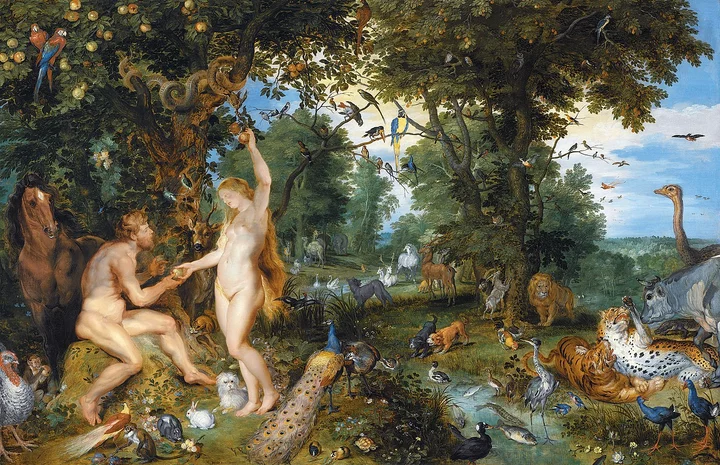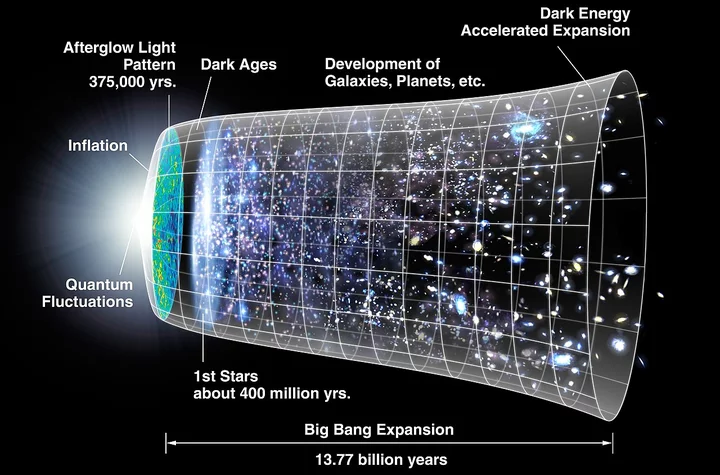“Science is about finding useful descriptions of the world; by useful I mean they allow us to make predictions … or explain already existing observations. The simpler an explanation, the more useful it is.”
— Sabine Hossenfelder, Existential Physics
###
In 1650, James Ussher, archbishop and professor at Trinity College in Dublin, published his calculation proving that the first moment of Creation, per the Book of Genesis, occurred at 6 p.m. on October 22, 4004 BC. (According to Neil Gaiman and Terry Pratchett’s novel Good Omens, his estimate was inaccurate “by almost a quarter of an hour.”) Rather than scoff, the late evolutionist Stephen Jay Gould wrote, “Ussher represented the best of scholarship in his time. He was part of a substantial research tradition, a large community of intellectuals working toward a common goal under an accepted methodology.”
It’s pretty hard to actually prove Ussher wrong. God could have faked the evidence, putting everything in place for us to find later on. Meanwhile, the geological record puts Earth at about 4.6 billion years old, a tad longer than Ussher’s six thousand years, but that’s science for you. Why should we believe science over the Bible? Because, per physicist and science communicator Sabine Hossenfelder, above, it’s useful. And it’s useful because it simplifies.
Take creation, Genesis vs. the so-called Big Bang theory. Genesis is complicated! For Ussher to make his calculation think of all the data required to put everything perfectly in place 6,000 years ago (complete with all that fake news). Then try to deduce anything from the Genesis story—how the 100-odd chemical elements were created, for instance. The real problem is that you can’t really do anything with the Genesis account. It’s not useful.
“The garden of Eden with the fall of man,” Jan Brueghel the Elder and Peter Paul Rubens. Public domain, via Wikimedia.
Compare that with the modern scientific story how those elements were formed, starting with the so-called Big Bang. Between the concordance model* and quantum theory (both of which require just a few input values), science can explain how elements formed. From simple initial conditions we can explain a lot. (This is reductionism.) Unlike Genesis, the scientific story is useful. You couldn’t end up with a smartphone if you got your science from the Bible.
* The currently accepted cosmological model, also known as “Lambda CDM,” which puts the Universe at 13.7 years old, says that it’s expanding at about 70 km/second per megaparsec, and that it consists mostly of so-called dark matter and dark energy. It doesn’t include the hypothetical Big Bang itself (neither big nor a bang), which is outside the purview of physics. Possibly forever.
Big Bang cosmology (NASA)
Of course, today’s science won’t be the last word. Science is an ongoing process of refining knowledge, striving towards truth without ever reaching it. For instance, it’s only about 160 years since one of the best scientists of his day, physicist Lord Kelvin (William Thompson) estimated the age of the Earth to be between 20 and 400 million years. He didn’t know about radioactivity, the “missing” source of energy that explains why our planet hasn’t frozen. Similarly with the sun: not knowing about nuclear fusion in 1860, Kelvin had no way of understanding how the sun could be more than 20 million years old.
Generations from now, scientists may revise or toss out the concordance model, or quantum theory, or the standard model of particle physics + general relativity, currently our best bets for big-picture understanding of the Universe and everything in it. But, unlike Ussher, or even Kelvin, what we’ve got now is useful. Quantum theory explains why your smartphone works (and allows chip makers to make next year’s model faster and smaller, albeit pricier); while general relativity empowers that phone to tell you where you are within about a yard. (When I tell my drone to Return to Home, it lands within two feet from where it took off, thanks to half a dozen or so satellites 22 thousand miles overhead.)
So science = simple explanations = useful. What’s not to love?
PS: New book just out! In color!



CLICK TO MANAGE